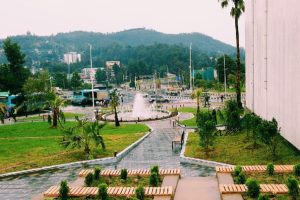
BY YOHANES JEMANEH
One of the most unique things about Ethiopians is their dressing styles. Especially during public celebrations and religious holidays, it is common for Ethiopians to get together adorned with artistically designed and uniquely embroidered colorful traditional attires. Attending events wearing own traditional clothes is a culture of Ethiopians which makes them gorgeous and proud of their local products.
Actually prioritizing and using local products rather than the imported ones is one of the ways to practically promote cultural values and national identities. Undertaking such activity will help to support local products and producers, promote indigenous knowledge and subsidize the economy.
Ethiopians’ traditional clothes made from handspun cotton are an indigenous knowledge of Ethiopians which has passed through generations. However, despite the fine forms, patterns and colors of these outfits, there is a tough effort exerted behind the curtain- the weavers have been struggling with traditional weaving tools that take longer time and energy to produce the attires.
Luckily, thanks to the expansion of higher educational institutions and workshops, these days improved machines are being produced; and lessening producers’ load.
Demis Kidane, innovator, works for one of the enterprises located in the capital; and is supported by Nefas Silk Polytechnic College. He has produced weaving machines with the support of the college. At an exhibition, the 12th Addis Ababa Technique, Vocation and Technology Week Exhibition, opened last Wednesday, he has demonstrated his work to exhibition attendees, including Mayor Adanech Abiebie and State Minister of Labor and Skills Beker Shalle (PhD).
“I usually witness the ardent effort of traditional weavers. I also know that they do not secure enough income compared to their labors working with outdated weaving tools. Therefore I came up with the idea of this machine by exploiting my knowledge in my field of study,” Demis said.
The weaving machine is made to produce six to seven meters of fabric per hour which had been taking longer hours in traditional tools. It is also functional during power outage as it is made to run manually in such a case. As to Demis, he did this technically to help people produce more without worrying about power-cut. The manual process produces only less than 15 percent of the regular productivity of the machine while it is running by power.
His machine replaces all works that have been made traditionally to weave fabrics. It spins, weaves, and winds fabrics. Therefore, it is a blessing for Ethiopian weavers to produce more clothes in a short time, saving their energy, time and cost; and secure the needed income from their products, Demis believed.
Nefas Silk Polytechnic College which has been partnering with Demis’s enterprise has provided 11 innovated products to various enterprises for replication. It has also planned to reproduce several weaving machines and provide to the targeted groups to promote indigenous knowledge; avail the anticipated emotional satisfaction and economic reward, College Dean Adugna Kassie said.
The machines save spaces and are vital to increase productivity; and promote modern weaving method. “We are working with the enterprise in providing production land so that it would produce and replicate more advanced machines. This helps to improve the income of the enterprises and economic growth of the nation through increasing productivity,” the Dean said.
Including weaving machines, the college has presented its innovation outputs at the Exhibition.
The exhibition themed “Vocation and Technology for Productivity” and was organized by Addis Ababa Technical Vocational Training and Technology Development Bureau aimed at demonstrating indigenous inventions that made for satisfying technological need of residents and the development activities of the city administration, said Adanech Abiebie while attending the event.
“We are working with all concerned bodies to ensure that industry; innovation and technology are the key tools for our city government to benefit our people in keeping with our promises.
We need to walk our talk on local products through buying and using them; promoting the goods and encourage producers. This is the major kind of mechanism in which we support nation’s economy practically,” Adanech said.
Labor and Skills State Minister Beker Shalle (PhD) on his part said that self-confidence is the key to every innovation. “We need to support indigenous innovations to resolve our problems.”
For Demis, the government ought to provide the needed support to innovators to encourage them for more products that can accelerate the country’s economic growth.
The Ethiopian Herald June 10/2022





